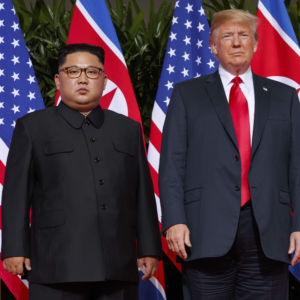President Donald Trump is facing such excruciating trouble on his own home front that you have to wonder when he’s going to get enough time off to see Kim Jong Un. For that matter, you wonder if Kim will really want to see him all that much, knowing that he’s besieged by enemies and may not even survive the remaining two years of his presidency, much less get elected to a second term.
Still, we have to believe South Korea’s President Moon Jae-in has reason to be confident that a second Trump-Kim summit is absolutely going to happen. He really sounded sure of himself when he said, at that New Year’s news conference, that “Chairman Kim’s visit to China shows a second summit between the United States and North Korea is nearing.” He also seemed to know pretty much what would be on the agenda.
The Trump-Kim summit in Singapore “was not specific enough,” Moon said, understating the vacuity of their joint statement in which they both professed to espouse “denuclearization of the Korean peninsula.” That statement was so vague as to be comparable to a declaration of faith in the virtues of the Almighty and motherhood — “Almighty” a carefully chosen, non-controversial reference neither to the Christian God nor to Lord Buddha nor to Allah but to the supreme being of any religion.
“I am sure they will come out with a concrete agreement,” was the English interpretation of his words in Korean that I heard over the simultaneous interpreting device for the question-and-answer session in the Blue House, the presidential complex in Seoul. I would have loved to have asked Moon how he could be so sure, whether he had talked to Trump or one of his top-most people, maybe Secretary of State Mike Pompeo or the national security adviser, John Bolton, but no luck. Amid all the hands raised to ask questions, I had no chance.
If the reason for Moon’s confidence in a second summit was not altogether clear, he seemed fully attuned to the skepticism in the United States about any understanding with Kim.
“There has been distrust and hostility between the U.S. and North Korea,” said Moon, clearly aware the Americans don’t take a “positive” view of any end-of-war declaration. He refused, however, to see it as a precursor to demands for withdrawal of U.S. troops from the South. “Whether to maintain U.S. forces is to be determined by the U.S. and South Korea,” he declared.
Fine, but missing from Moon’s remarks was one major consideration about which no one asked. What if Trump’s wings are clipped in the ruckus in Washington over his stubborn bid to get the Congress to approve more than $5 billion to build a wall for the sole purpose of excluding a flood of illegal immigrants from pouring over the southern U.S. border? Or what if the U.S. government is still virtually shut down, payrolls suspended, normal duties in limbo, while the House of Representatives, dominated by Democrats dedicated to chase the Republican Trump out of the White Houses, refuses to authorize funding?
It’s hard to imagine Trump gallivanting off to see Kim as long as this crisis goes on. Moreover, the crisis may be going strong even if he gets his way on The Wall. Powerful House committees are gearing up to eviscerate him for having compromised American interests in his dealings with Russia’s President Vladimir Putin.
That investigation may consume the remainder of Trump’s presidency. The House could actually vote to impeach him. Then, if enough members of Trump’s own party in the Republican-controlled Senate were to join the Senate’s Democratic minority in finding him guilty as charged in the impeachment, he’d be gone, ousted, the first president to be kicked out so unceremoniously. (Richard Nixon resigned as the axe was about to fall. Andrew Johnson, who took office after Abraham Lincoln’s assassination, avoided ouster by one vote in the Senate.)
Trump has made clear he would really like to embrace Kim again. He sent him a letter recently pleading for a second summit. Kim has indicated previously that he hopes to see him. Trump could still serve Kim’s purposes if he decides on further cutbacks in the number of U.S. troops in South Korea, now 28,500, while going along with that end-of-war or peace declaration.
Kim should know, though, that Trump, when they meet, may be more than a lame duck. He could be a wounded wild animal, screaming madly, pathetically, at the media, lying and denying, protesting too much against the slights and slurs of his enemies. A sad sight to imagine.

